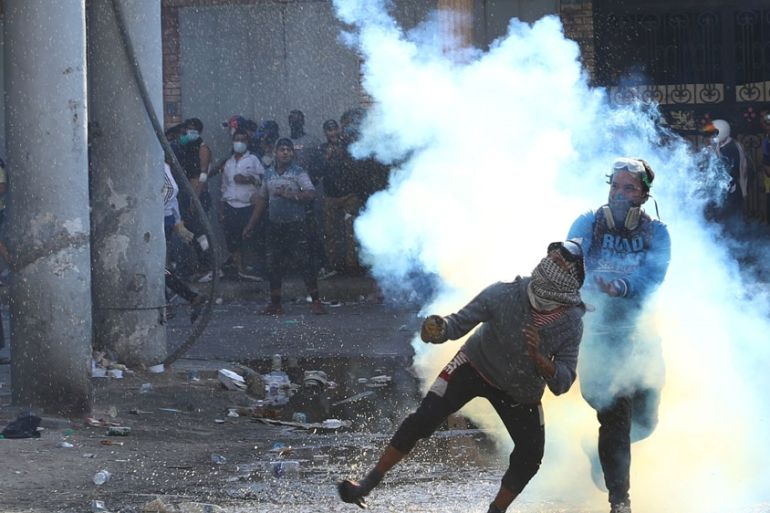‘Several protesters killed’ in Baghdad clashes
Anti-gov’t rallies in Iraqi capital turn bloody after Shia leader al-Sistani urges quick electoral reform to end crisis.

At least four people have been killed and several others wounded as security forces clashed with anti-government protesters in the Iraqi capital, Baghdad, according to security and medical officials.
Friday’s casualties took place during fierce clashes near a strategic bridge in central Baghdad that leads to the city’s heavily fortified Green Zone, the seat of Iraq‘s government.
Two people died from bullet wounds, according to police and medical sources, while two died after being hit by tear gas canisters. At least 61 others were wounded.
The prime minister’s military spokesman on Friday denied any protesters were killed.
Al-Sistani urges electoral reform
Earlier on Friday, Iraq’s top Shia leader, Grand Ayatollah Ali al-Sistani, called for the country’s politicians to speed up the reform of electoral laws, saying the changes were the only way to resolve the deadly unrest that has unfolded in recent weeks.
“We affirm the importance of speeding up the passing of the electoral law and the electoral commission law because this represents the country moving past the big crisis,” al-Sistani’s representative said during a sermon in the Shia holy city of Karbala.
Iraq’s President Barham Salih has promised to hold a snap parliamentary election once a new law is passed in a bid to placate the protesters, but has not outlined any timeline for the vote.
Al Jazeera’s Mohammed Jamjoom, reporting from Baghdad, said a parliamentary session was expected to take place on Saturday during which the electoral reform law would be given a second reading, paving the way for a possible parliamentary vote on the legislation next week.
“The reason that is important is because one of the key things that the government has been saying is that in order to placate the demonstrators they are going to pass electoral reform in some form or fashion,” Jamjoom said.
“But the protesters just don’t trust what the government is saying, they think the rhetoric is more of the same and they don’t believe the government is in a hurry to try and pass substantial reform,” he added.
“Because of that, they say they are going to continue to come out day after day, no matter what threat might be posed to them, because they want to continue to send a message to the government that they will not stop until their demands are met.”
Hundreds killed
More than 300 people have been killed and thousands of others wounded since Iraq’s anti-government protests erupted at the start of October, sparked by widespread anger over official corruption, mass unemployment and failing public services.
The demonstrations have gripped Baghdad and several cities in Iraq’s south, posing the biggest challenge yet to the year-old government of Prime Minister Adel Abdul Mahdi.
Many say the country’s authorities have failed to improve the lives of its citizens despite a period of relative calm ushered in following the defeat of the Islamic State of Iraq and the Levant (ISIL or ISIS) armed group two years ago.
Nearly three-fifths of Iraq’s 40 million people live on less than $6 a day, World Bank figures show, despite the country housing the world’s fifth-largest proven reserves of oil.
Millions lack access to adequate healthcare, education, clean water and electricity, with much of the country’s infrastructure in tatters.